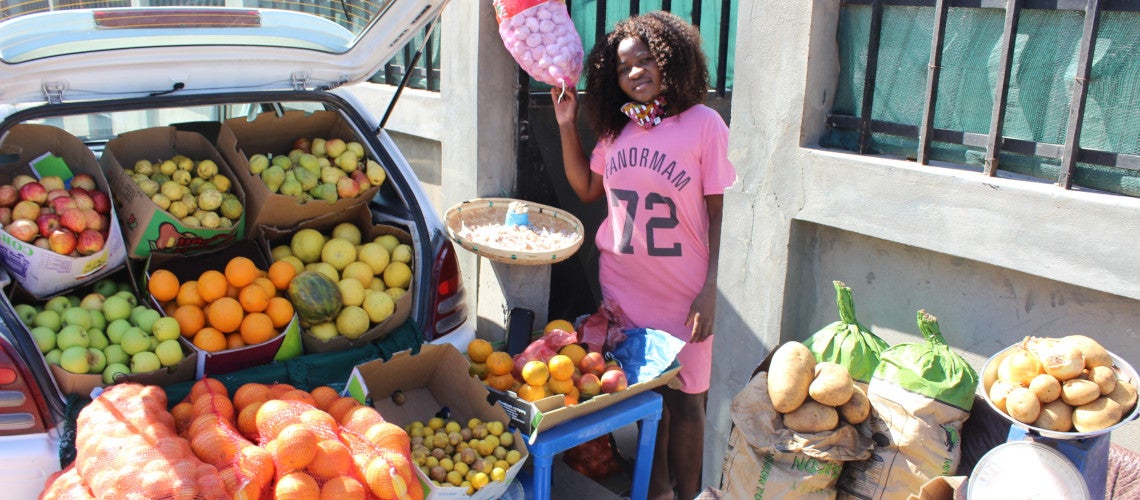 Selling processed food from her vehicle on the streets of downtown Maputo
Selling processed food from her vehicle on the streets of downtown Maputo
The significant hardship posed by COVID 19 to the poor and most vulnerable households is unparalleled in the country’s recent history . The mandated confinement and social distancing measures in force during an extended period of time, whilst beneficial to flatten the curve of transmission, are having an adverse economic impact on people’s livelihoods and severely hampering their ability to earn a living in the informal sector, making safety nets all the more an imperative in times of Covid-19.
We met Adelaide, an informal food retailer and resident of Chamanculo, a populous neighborhood on the outskirts of Maputo who agreed to share her story with us. Her ability to cross the border to South Africa where she procures most of the food staple and other grocery items that she resells is severely limited due to imposed restrictions on non-essential travel. Furthermore, she complained of a sharp drop in her usual clientele’s purchasing power since most of whom are out of work. Like her, Felizarda Joaquim, who sells meals from a vehicle on the streets of downtown Maputo, deplores the reduced traffic and the closure of many offices, grinding her entire business to a halt. She now sells fruits and vegs but complains of limited buyers.
Informality in urban and rural settings remains very much prevalent in Mozambique: about 80% of the Mozambican labor force work in the informal sector, with a majority of retail informal firms likely to be majority-owned by women 52% , against 45% for manufacturing and 38% for services, according to a recent World Bank report. Like Adelaide and Felizarda, those informal workers, who account for 31% of GDP, do not possess savings or income replacement.
In order to alleviate the economic impact on those poor and vulnerable families directly dependent on the informal sector, the World Bank has teamed up with other development partners in its support to the Government of Mozambique’s efforts to expand the social safety net coverage in urban and peri-urban areas for Covid-19 affected families. Thus, one of the most ambitious and agile social safety net response plans in the region is now in implementation benefiting directly more than 1.5 million affected families. Among some of the program’s activities it is worth highlighting the following:
- The program is providing a single cash transfer equivalent to 3 months of regular subsidies to beneficiaries of Basic Social Assistance Program (PSSB) and Productive Social Protection Program (PASP). In total, the initiative covers 566,642 households across the country and has an estimated cost of US$ 25.4 million.
- Likewise, the government under the same partnership with the Bank, Sweden, and the UK’s DfID is implementing the Post Emergency Direct Cash Transfers Program (PASD-PE Covid) to a total of 990,000 new beneficiaries, representing almost 40% of the poor urban population. This program provides unconditional cash transfers of Mt.1,500 per month (equivalent to US$ 21) during six months to low income families and informal workers in urban and peri-urban areas. The Government has secured funding for the first phase covering 290,000 families in priority urban areas with a total cost of US$45 million. An additional resource mobilization is underway for the second phase estimated at US$120 million.

An important challenge in making social safety net programs effective is improving the delivery, prioritization and targeting of social transfers, along with enhancing accountability and monitoring, by leveraging digital platforms and tools. Making sure that the current efforts aimed at expanding the provision of safety nets target the right people, and that cash transfers reach the poor is a challenge, especially in a context where 46% of adults in Mozambique are excluded from the formal financial services, according to the 2019 FinScope Survey. Women, who are most affected by the effects of the pandemic, are more excluded from financial services than men: 48% of women are excluded relative 43% of men. Rural areas are particularly disadvantaged with 60% of rural residents financially excluded relative 21% of urban residents.
Under the same partnership with the government, the Bank-supported PASD-PE Covid and Financial Inclusion and Stability Project are supporting the introduction of digital payments to deliver cash transfers through mobile wallets using the existing mobile networks. This innovative approach follows best practices from countries in the region, including Kenya and Zambia, and has benefited from a broad stakeholder engagement that includes Mozambique’s Ministry of Economy and Finance, Central Bank, Social Protection Ministry and Agency, and Telecommunications Regulator as well as the technical assistance from the World Bank.
Other tools and technology have been used to ensure accurate geographical prioritization and targeting as well. The selection of priority areas was based on a multimethodological approach using the MultiDimensional Poverty Index mapping that combines social and economic indicators using the recent Census with high resolution satellite imaginary of urban poverty maps. At least 50,000 families in Cabo Delgado have thus been targeted due to the rapid Covid-19 transmission in the province, as well as economic vulnerability exacerbated by armed conflict in some parts of the province. The availability of mobile coverage for digital payments has been facilitated by information provided on network coverage in different localities throughout the country.
Last but not least, a coalition of national and international partners that includes civil society organizations have been mobilized to contribute to the successful implementation of the above program by helping to monitor the deliverables, especially by channeling grievances; ensuring the program is responsive and accountable; and by playing a role in the delivery of cash transfers in specific areas. In addition to the above-mentioned partners for the cash transfer component, UNICEF, Sweden, World Bank, DfID, ILO, and WFP have been providing technical assistance to the Social Protection Technical Advisory Group under the leadership of the government’s Ministry of Children, Gender and Social Action.





Join the Conversation